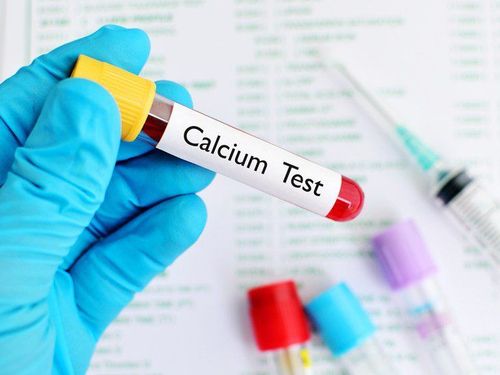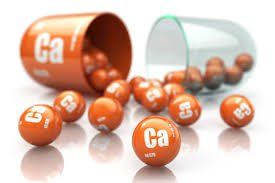This is an automatically translated article.
Quantitative blood calcium test aims to evaluate parathyroid gland function and blood calcium metabolism. Quantitative calcium ionization also helps diagnose kidney failure, kidney transplantation, hyperparathyroidism and other malignancies.1. Overview of blood calcium levels
1.1. Forms of calcium in the blood Nearly half of the calcium in the blood exists in two forms:Free calcium (as Ca2+ ions): Unaffected by serum albumin levels. Protein bound calcium (mainly with albumin): A decrease of 1g will lead to a decrease in total serum calcium concentration of about 0.8 mg, and vice versa. Serum calcium is the sum of the two, but usually the doctor will measure serum albumin and serum calcium together.
1.2. Elevated serum calcium When the laboratory results showed an increase in serum calcium, the patient was diagnosed with hypercalcemia. There are two most common causes of this syndrome: hyperparathyroidism and malignancies. For hyperparathyroidism, parathyroid hormone increases calcium levels by:
Increases absorption of calcium in the digestive tract chemical; Decreased urinary calcium excretion; Increase calcium reabsorption from bone; On the other hand, malignancies can increase calcium levels in two ways:
Myeloma, lung, breast, or renal cell cancer that metastasizes to the bone and destroys the bone, causing resorption, at the same time push calcium into the blood. Lung, breast, or kidney cell cancers can produce a hormone similar to parathyroid hormone, causing serum calcium.

Ung thư phổi có thể làm tăng nồng độ canxi
1.3. Hypocalcemia Hypocalcemia occurs in patients with hypoalbuminemia with the following common causes:
Malnutrition: Especially in alcoholics. Massive intravenous infusion: Massive blood transfusion causes anticoagulants (citrate salts) to bind to the free calcium in the recipient's blood. Other causes: Intestinal malabsorption, renal failure, rhabdomyolysis, alkalosis, and acute pancreatitis. Long-term hypocalcemia leads to hypomagnesemia.
2. Blood calcium test
2.1. Definition Blood calcium quantification is a type of blood test, also known by other medical technical names: test for total calcium, ion calcium, or serum calcium. In addition, quantification of ionized calcium may also be ordered with a urine sample, also known as a urinary calcium test. Increased urinary calcium excretion is synonymous with hypercalcemia, and vice versa.Measurement of calcium in the blood and urine helps to determine the amount of calcium in the body but except in the bones. To find out how much calcium is in the bones, a bone density test is done, similar to an X-ray. On the other hand, the urinary calcium test is often used to diagnose the cause of recurrent kidney stones.
2.2. Indications Through direct measurement of total blood calcium or ionized calcium quantification, the purpose of calcium testing is to:
Assess parathyroid gland function and blood calcium metabolism. Determination of serum calcium helps to monitor some diseases. Monitor calcium levels during and after mass transfusion. Patients with hypocalcemia with symptoms such as: cramps, stiffness or muscle twitching in the fingers or mouth. Patients with hypercalcemia with symptoms such as: fatigue, lack of energy, loss of appetite, nausea and vomiting, constipation, polyuria, abdominal pain or bone pain. Quantification of calcium ions in neonates and low birth weight. In addition, a blood calcium test may also be performed as part of routine blood tests.

Xét nghiệm canxi máu cũng có thể được tiến hành như một phần của các xét nghiệm máu thông thường
Has vitamin D toxicity; Drinking too much calcium-containing milk; Changes in serum pH; Decrease in albumin is associated with hypocalcemia; Under the influence of certain drugs. Normally, the amount of calcium in the blood also has small changes depending on the time of day, specifically the calcium level will peak at about 9pm to 11pm.
2.4. The procedure does not need to be fasted before performing a calcium quantitative test, but if there are some other tests associated with it, the patient should follow the doctor's advice.
At the same time, it is also necessary to listen to the doctor explain the purpose of the test and guide the procedure. Medical staff will draw blood from the patient in the same sequence of steps as a regular blood test. A blood sample is collected from a vein and then placed in a test tube and analyzed.
3. Instructions for reading results
Table 3.1. Average total calcium value.| Đối tượng / Đơn vị | mg/dl | mmol/l |
| Trẻ dưới 10 ngày tuổi | 7.6 - 10.4 | 1.9 - 2.6 |
| Máu dây rốn | 9.0 - 11.5 | 2.25 - 2.28 |
| Trẻ 10 ngày – 2 năm tuổi | 9.0 - 10.6 | 2.3 - 2.65 |
| Trẻ em lớn hơn 2 tuổi | 8.8 - 10.8 | 2.2 - 2.7 |
| Người lớn | 9.0 - 10.5 | 2.25 - 2.62 |
Table 3.2. Mean Ionized Calcium Quantitative Value.
| Đối tượng / Đơn vị | mg/dl | mmol/l |
| Trẻ mới sinh | 4.20 - 5.58 | 1.05 - 1.37 |
| Trẻ 2 tháng – 18 tuổi | 4.80 - 5.52 | 1.20 - 1.38 |
| Người lớn | 4.5 - 5.6 | 1.05 - 1.3 |
3.1. Hypercalcemia: The warning value of hypercalcemia is when total calcium > 13 mg/dL and ionized calcium > 7 mg/dL. This can be the result of:
Hyperparathyroidism; Cancer (bone, breast, bronchi...); Tuberculosis; Lying motionless for a long time; Deformed osteomyelitis, multiple myeloma, ... Using a lot of Vitamin D and some other diseases. 3.2. Hypocalcemia (hypercalcemia) Blood calcium alarm values decrease when total calcium < 6 mg/dL and ionized calcium < 2.2 mg/dL. This can be a sign of a number of diseases such as:
Hypoparathyroidism; Vitamin D deficiency, rickets or malnutrition; Diseases related to the kidneys; Other: Pancreatitis, osteoporosis, malabsorption, ... A blood calcium test is a necessary step in the general examination to detect diseases related to the bones and kidneys, certain types of cancer or other symptoms. other evidence. Quantitative calcium ionization also helps to monitor and treat cases of premature and low birth weight babies, or to evaluate unwanted side effects of drugs. The range of mean values for this test may not be uniform across testing facilities, so it is advisable to consult your doctor if you have questions about the test results and associated diagnoses.
Please dial HOTLINE for more information or register for an appointment HERE. Download MyVinmec app to make appointments faster and to manage your bookings easily.













